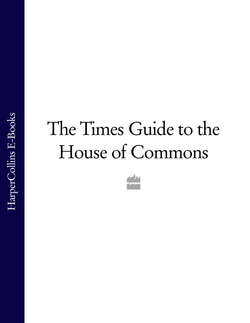Читать книгу The Times Guide to the House of Commons - Литагент HarperCollins USD, Ю. Д. Земенков, Koostaja: Ajakiri New Scientist - Страница 60
Select Committees
ОглавлениеSince the 1970s, a number of far-reaching changes have been introduced, most significantly in 1979 with the creation of 12 broadly departmental select committees. Each big department is monitored by a select committee to examine its policymaking and performance. There have been variations in the number, titles and remit of committees to match changes in the machinery of government, but the principle has remained. This has created wideranging opportunities for MPs to question ministers, civil servants and interested bodies, and has unquestionably broadened the range of public debate. For instance, the opening up of decisions on setting interest rates, both in the mid-1990s and then with the creation of the Monetary Policy Committee in 1997, has meant that the Governor and senior directors of the Bank of England appear before the Treasury committee at least once a quarter.
There has been a similar opening up in other areas of policy. The banking crisis was examined frequently from autumn 2007 onwards by the Treasury Select Committee, when all the main players appeared at often uncomfortable hearings. The Defence Select Committee also pursued allegations that British troops in Iraq and Afghanistan were inadequately supplied and supported. The public gathering of evidence and the questioning of ministers has often been more important than the recommendations in the final reports.
There were three waves of reform during the Labour years: when Robin Cook was Leader of the Commons from June 2001 until March 2003; when Jack Straw was Leader from 2006 until 2007; and, finally, in the aftermath of the expenses scandal, when a special committee was set up under the respected Labour MP and political scientist Tony Wright to examine ways of strengthening the influence of the Commons and of backbenchers.
Among the changes have been a strengthening in the role of select committees in 2002 by giving them ten core tasks, including examining annual departmental reports and expenditure plans, aided by the creation of a central Scrutiny Unit to provide expert support in addition to the clerks and advisers to particular committees. But each committee has its own distinctive style, priorities and approach, notably reflecting the personality of the chairman. Additional pay for select committee chairmen was introduced from October 2003, while from 2007 the committees were given the additional role of holding pre-appointment hearings for those chairing a variety of public bodies. This is not, however, a veto power, as was shown when Ed Balls brushed aside the objections of the Childrens, Schools and Families Select Committee to an appointment in his area. In 2009, eight new regional committees were set up, despite the protests from the main opposition parties.
The Prime Minister was, for a long time, above this process, but, since July 2002, he has given evidence for about two and a half hours twice a year to the Liaison Committee, which consists of the chairmen of the main select committees. This enables a wide range of topics to be raised, but at times it can be too wide since neither Tony Blair nor Gordon Brown, in their very different ways, was ever discomfited during an appearance.
